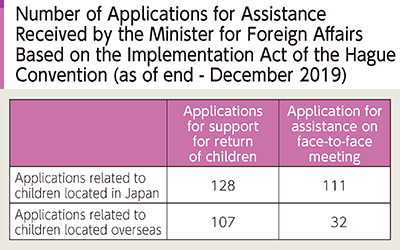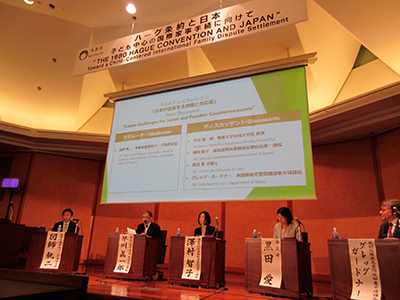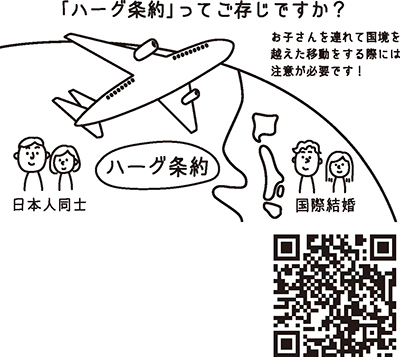Diplomatic Bluebook 2020
Chapter 4
Japan's Diplomacy Open to the Public
4 The Convention on the Civil Aspects of International Child Abduction (the Hague Convention) and its Implementation
The Hague Convention is designed as an international mechanism for addressing disputes arising from the wrongful removal or retention of children across borders in the belief that the interests of children are of paramount importance. It requires cooperation between Contracting States to the Convention for returning children to their state of habitual residence and establishing opportunities for transboundary parent-child access.
This Convention came into force in Japan on April 1, 2014. As of December 31, 2019, 101 countries including Japan are parties to the Convention.
The Convention is implemented through mutual cooperation among the governmental agencies designated as the Central Authority in Contracting States to the Convention. In Japan, MOFA as the Central Authority avails itself of experts in various fields and communicates/cooperates with foreign Central Authorities, and provides assistance to the parties such as locating the whereabouts of the child and arranging mediation services aimed at amicable resolutions.
In the five years and nine months between the entry into force of the Convention and the end of December 2019, MOFA received a total number of 378 applications: 235 applications seeking the return of the child and 143 applications seeking access to the child. Of the cases seeking the return of the child from Japan to another country, children were returned in 40 cases and conclusions were reached not to return the child in 35 cases. Of the cases requesting the return of the child from another country to Japan, children were returned in 39 cases and conclusions were reached not to return the child in 24 cases.
In February 2019, MOFA invited a U.S. lawyer with in-depth knowledge of court proceedings for Hague cases in the U.S. so that persons involved in Japan's implementation of the Hague Convention can learn from his expertise, and lecture meetings and other events were organized for that purpose. The Symposium Commemorating the Fifth Anniversary of Japan's entry into the 1980 Hague Convention was held at the University of Tokyo in June, during which participants engaged in in-depth discussions about the implementation status of the Hague Convention in Japan and future issues (see the Special Feature on page 348).
In addition to this, MOFA works with diplomatic missions overseas to actively hold seminars to raise awareness among Japanese nationals living overseas. Also, efforts are put into PR activities, including holding seminars in Japan for local governments, relevant institutions such as bar associations, and diplomatic corps in Tokyo.
In February, a PR video on the Hague Convention was released as a part of efforts to raise public awareness of the Convention among a wider range of people.

With the rise in the movement of people and international marriages around the world, the international community has increasingly been facing issues since the 1970s, such as child removal by one parent. In response, the Hague Convention on the Civil Aspects of International Child Abduction (Hague Convention) was concluded in 1980. With a surge in the number of international marriages between Japanese nationals and foreign nationals in the latter half of the 1980s, from about 5,000 per year in 1970 to about 21,000 in 2017, the Hague Convention entered into force on April 1, 2014 after various discussions held in Japan.
As 2019 marks five years since the Hague Convention came into effect in Japan, MOFA held a symposium commemorating the fifth anniversary of Japan's entry into the 1980 Hague Convention “The 1980 HAGUE CONVENTION AND JAPAN - Toward a Child-Centered International Family Dispute Settlement” at the University of Tokyo on June 10, 2019. Here, family dispute settlement refers to procedures to resolve disputes within families.
 Participants engaging in discussion in the panel discussion (June 10, Tokyo)
Participants engaging in discussion in the panel discussion (June 10, Tokyo)This symposium was convened for three purposes: (1) To equip more people with correct knowledge on the Hague Convention and the issue of child abduction; (2) To facilitate better understanding of the implementation status of the Convention in Japan over the past five years; (3) To provide an opportunity for deepening national debates on the approach to family dispute settlement relating to children.
This symposium drew more than 190 audience members, including those who are involved in the implementation of the Hague Convention such as lawyers and court officers, diplomatic corps in Tokyo, researchers, and students. During two sessions, the participants engaged in lively discussions on the approach to family dispute settlement relating to children.
 Video introducing the Hague Convention “Let's study the Hague Child Abduction Convention Whiteboard animation”
Video introducing the Hague Convention “Let's study the Hague Child Abduction Convention Whiteboard animation” (https://www.mofa.go.jp/ca/ha/page25e_000146.html)
(1) First Session: Japan's Five-year Experience in Implementing the 1980 Hague Convention and its New Challenges
In the keynote lectures, representatives from MOFA, the Supreme Court of Japan, and the U.S. Department of State presented information about Japan's five-year experience in implementing the Hague Convention, court proceedings for Hague cases in Japan, and U.S.-Japan Hague cases from the U.S. perspective, respectively. Following that, experts and attorneys with a wealth of experience in cases on the order for the return of a child based on the Hague Convention joined in the panel discussion. The panelists discussed the difficulties that Japan has faced to date in implementing the Convention countermeasures, and deepened discussions on the future challenges that Japan needs to address, such as efforts to speed up the procedures based on the Convention and mechanisms for enhancing the effectiveness of compulsory execution procedures for the return of a child.
(2) Second Session: The Way Forward
In the keynote lectures, a professor from the UK who specializes in international family laws spoke about the long-term effects of abduction on children and the importance of care for children after reunification with their parents. Following that, an American attorney and mediator with experience in conducting training for Japanese domestic relations conciliation commissioners, spoke about the merits of using international family mediation in international family dispute cases involving parties of different nationalities and cultural backgrounds. In the panel discussion after that, attorneys and experts joined in-depth discussions on the importance of prioritizing the interests of children and listening to the children in family dispute settlement.
This symposium helped to deepen understanding among a diverse group of participants on matters such as the framework of the Hague Convention and court proceedings in Japan. It also offered participants the opportunity to provide feedback and various views on the implementation status of the Hague Convention in Japan to date, as well as other related topics. Japan will continue to put effort into the steady implementation of the Hague Convention.

